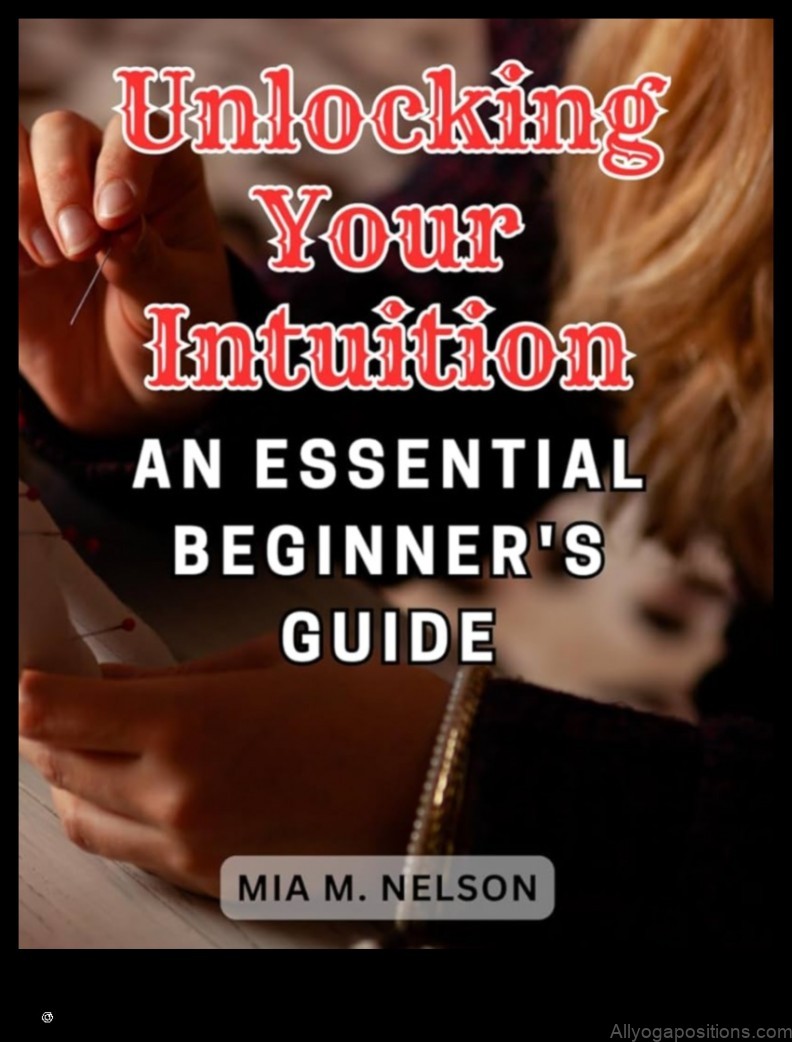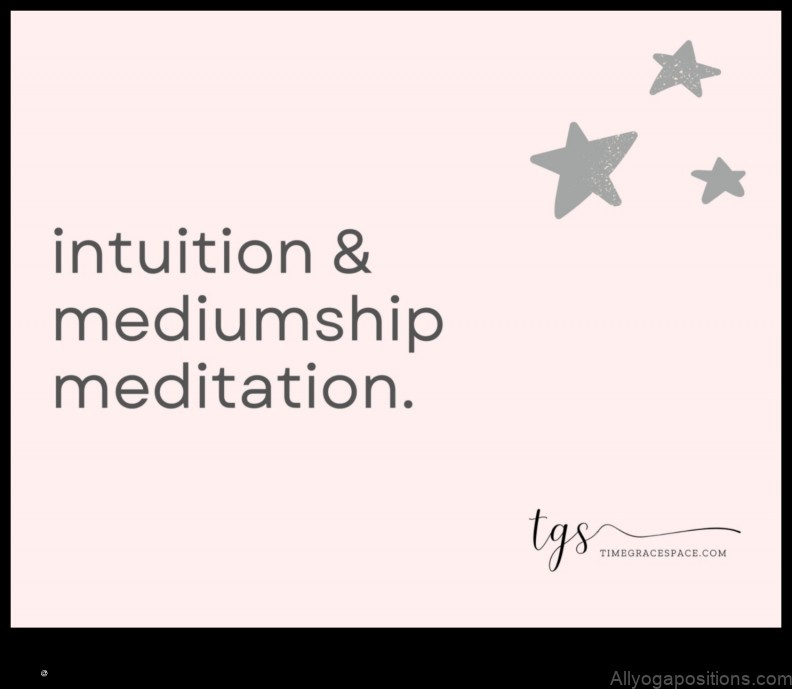
Introduction
Meditation and intuition are two powerful tools that can help you to live a more fulfilling and meaningful life. Meditation can help you to relax, reduce stress, and improve your focus. Intuition can help you to make better decisions, connect with your inner wisdom, and live in alignment with your true purpose.
In this article, we will explore the relationship between meditation and intuition. We will discuss how meditation can help you to develop your intuition, and we will provide tips on how to use your intuition to make decisions and live your life more intentionally.

What is meditation?
Meditation is a practice that involves focusing your attention on a single object, thought, or breath. Meditation can be done in a variety of ways, but the goal is always to quiet the mind and achieve a state of deep relaxation.
Meditation has been shown to have a number of benefits for both physical and mental health. Meditation can help to reduce stress, improve focus, boost creativity, and promote overall well-being.
Benefits of meditation
Meditation has been shown to have a number of benefits for both physical and mental health. Some of the benefits of meditation include:
- Reduced stress
- Improved focus
- Boosted creativity
- Increased happiness
- Improved sleep
- Reduced pain
- Enhanced immune function
- Reduced risk of heart disease and stroke

How to meditate
There are many different ways to meditate, but the basic steps are as follows:
- Find a comfortable place to sit.
- Close your eyes and relax your body.
- Focus your attention on your breath.
- Let go of any thoughts or distractions that come into your mind.
- Continue to focus on your breath for as long as you like.
It is important to practice meditation regularly in order to reap the full benefits. Even a few minutes of meditation each day can make a big difference.
Meditation and intuition
Meditation can help you to develop your intuition in a number of ways. Meditation can help you to quiet the mind and become more present, which can make it easier to hear your intuition. Meditation can also help you to increase your awareness of your body and your emotions, which can give you more information to work with when making decisions.
When you meditate, you are essentially training your mind to focus on the present moment. This can help you to become more aware of your intuition, which is often communicated through feelings, images, and gut instincts.
How to develop intuition
There are a number of things you can do to develop your intuition. Some of the things you can do include:
- Meditate regularly
- Spend time in nature
- Journal your thoughts and feelings
- Trust your gut instincts
- Seek out guidance from trusted friends and family
It is important to remember that intuition is a skill that takes time and practice to develop. The more you practice, the better you will become at listening to your intuition and using it to make decisions.
Benefits of intuition
Intuition can have a number of benefits in your life. Intuition can help you to:
- Make better decisions
- Connect with your inner wisdom
- Live in alignment with your true purpose
-
Topic Answer Intuition Intuition is the ability to understand something without conscious reasoning. It is often described as a gut feeling or a sixth sense. Meditation Meditation is a practice that involves training the mind to focus on a single point of attention. It can be used to improve focus, reduce stress, and promote relaxation. Inner guidance Inner guidance is the feeling of being guided by a higher power or force. It can be experienced as a sense of intuition, inspiration, or guidance. Spirituality Spirituality is the belief in a higher power or force. It can be expressed through religion, meditation, or other practices. Trust Trust is the belief that someone or something is reliable, trustworthy, and dependable. It is essential for healthy relationships and a fulfilling life. II. What is meditation?
Meditation is a practice that involves training the mind to focus on a single point of attention. This can be anything from your breath to a mantra or visualization. Meditation can help to improve focus, reduce stress, and promote relaxation. It can also be used to develop intuition and connect with your inner guide.
III. Benefits of meditation
Meditation has been shown to have a number of benefits for both physical and mental health. Some of the benefits of meditation include:
- Reduced stress and anxiety
- Improved focus and concentration
- Increased happiness and well-being
- Improved sleep
- Reduced pain
- Enhanced immune function
- Lowered blood pressure
- Reduced risk of heart disease and stroke
These benefits are due to the fact that meditation helps to calm the mind and body, and to increase awareness and mindfulness. When we meditate, we are able to quiet the constant chatter of our thoughts and to focus on the present moment. This can help to reduce stress and anxiety, and to improve our overall sense of well-being.
Meditation can also help us to become more focused and concentrated. When we are able to focus on the present moment, we are less likely to be distracted by worries about the past or the future. This can help us to be more productive at work or school, and to enjoy our leisure time more fully.
Meditation can also help us to become happier and more well-being. When we are able to quiet our minds and to focus on the present moment, we are more likely to experience positive emotions such as joy, gratitude, and compassion. This can lead to a more positive outlook on life, and to an increase in our overall sense of well-being.
Meditation can also help us to sleep better. When we are stressed or anxious, it can be difficult to fall asleep or stay asleep. Meditation can help to reduce stress and anxiety, and can also help to improve our sleep quality.
Meditation can also help to reduce pain. When we meditate, we are able to relax our muscles and our minds. This can help to reduce pain by decreasing the production of stress hormones and by increasing the production of endorphins.
Meditation can also enhance immune function. When we meditate, we are able to reduce stress and inflammation. This can help to improve our immune function and to protect us from illness.
Meditation can also lower blood pressure and reduce the risk of heart disease and stroke. When we meditate, we are able to relax our bodies and our minds. This can help to lower blood pressure and to reduce the risk of heart disease and stroke.
Overall, meditation has a number of benefits for both physical and mental health. It can help to reduce stress and anxiety, improve focus and concentration, increase happiness and well-being, improve sleep, reduce pain, enhance immune function, lower blood pressure, and reduce the risk of heart disease and stroke.
V. Meditation and intuition
Meditation and intuition are two closely related practices that can be used to connect with your inner self and gain a deeper understanding of yourself and the world around you.
Meditation is a practice that involves focusing your attention on a single point, such as your breath or a mantra. This can help to quiet your mind and allow you to relax and become more present.
Intuition is a gut feeling or inner knowing that comes from a place beyond your conscious mind. It is often described as a “sixth sense” or “inner guidance.”
When you meditate, you are creating a space for your intuition to come forward. By quieting your mind and focusing on your breath, you are able to still your thoughts and allow your intuition to speak to you.
Meditation and intuition can be used together to create a powerful practice for self-growth and spiritual development.
V. Meditation and intuition
Meditation and intuition are often seen as complementary practices. Meditation can help to quiet the mind and open up the space for intuition to arise. When we meditate, we are training our attention to focus on the present moment, and this can help us to become more aware of our inner guidance. Intuition is a natural ability that we all have, but it can be difficult to access when our minds are busy and stressed. Meditation can help to create the conditions for intuition to flourish.
When we meditate, we are not only calming our minds, but we are also connecting with our deeper selves. This deeper self is often referred to as the “inner knowing” or the “higher self.” It is the part of us that is connected to all of creation, and it is the source of our intuition.
When we meditate regularly, we can learn to access our intuition more easily. We can learn to trust our inner guidance and to use it to make decisions in our lives. Intuition can help us to make better choices, to avoid pitfalls, and to live more fulfilling lives.
Meditation and intuition are powerful tools that can help us to live happier, healthier, and more fulfilling lives. When we combine these two practices, we can open ourselves up to a world of possibilities.
VI. How to develop intuition
There are many ways to develop intuition. Some of the most common methods include:
- Meditation
- Journaling
- Dream work
- Yoga
- Tai chi
- Qigong
- Art therapy
- Music therapy
- Nature walks
When you engage in these activities, you are opening yourself up to your inner wisdom and allowing it to flow freely. You are also creating a space for your intuition to grow and develop.
It is important to note that intuition is not something that you can force. It is a natural ability that we all have, but it takes time and practice to develop. If you are patient and persistent, you will eventually be able to tap into your intuition and use it to make decisions in your life.
Here are some tips for developing your intuition:
- Be open to receiving messages from your intuition.
- Trust your gut feelings.
- Pay attention to synchronicities and coincidences.
- Journal your dreams and insights.
- Meditate regularly.
- Spend time in nature.
- Surround yourself with positive people.
- Do things that you love.
- Be grateful for what you have.
By following these tips, you can create a space for your intuition to grow and develop. You can also learn to trust your intuition and use it to make decisions in your life.
VII. Benefits of intuition
Intuition can provide a number of benefits, including:
- Improved decision-making
- Greater creativity
- Enhanced problem-solving
- Increased self-awareness
- Better relationships
- Reduced stress
- Increased happiness
When we trust our intuition, we are able to access a deeper level of wisdom and knowledge. This can help us to make better decisions, solve problems more effectively, and live more fulfilling lives.
Intuition is a powerful tool that can be used to improve our lives in many ways. By learning to trust our intuition and to listen to its guidance, we can open ourselves up to a world of possibilities.
Using intuition in your life
VIII. Using intuition in your life
Intuition is a powerful tool that can help you make better decisions, connect with your inner wisdom, and live a more fulfilling life. Here are some tips for using intuition in your life:
- Be open to receiving intuitive messages. Pay attention to your gut feelings, dreams, and synchronicities. These can all be signs that your intuition is trying to communicate with you.
- Trust your intuition. When you have a gut feeling about something, even if it doesn’t make sense logically, it’s worth considering. Your intuition is often trying to protect you from harm or lead you to something good.
- Meditate regularly. Meditation can help you to quiet your mind and become more receptive to intuitive messages.
- Spend time in nature. Spending time in nature can help you to connect with your inner wisdom and receive intuitive guidance.
- Surround yourself with positive people. The people you spend time with can have a big impact on your intuition. Surround yourself with positive people who support and encourage you to use your intuition.
Using intuition can be a powerful way to improve your life. By following these tips, you can learn to trust your intuition and use it to make better decisions, connect with your inner wisdom, and live a more fulfilling life.
IX. Challenges of intuition
Intuition can be a powerful tool, but it can also be challenging to use. Here are some of the challenges of intuition:
- Intuition is not always reliable. Sometimes, our intuition can lead us astray.
- It can be difficult to distinguish between intuition and wishful thinking.
- Intuition can be difficult to explain to others.
- Intuition can be difficult to act on.
Despite these challenges, intuition can be a valuable tool if we learn to use it effectively. By paying attention to our intuition and learning to trust it, we can make better decisions and live more fulfilling lives.
X. FAQ
Here are three common questions about meditation and intuition, along with answers:
Question 1: What is the difference between meditation and intuition?
Meditation is a practice that helps you to focus your attention and relax your mind. Intuition is a gut feeling or hunch that you get about something.
Question 2: How can I develop my intuition?
There are a number of ways to develop your intuition, including meditation, journaling, and spending time in nature.
Question 3: How can I use my intuition in my life?
You can use your intuition to make decisions, solve problems, and connect with your inner wisdom.
Table of Contents
Maybe You Like Them Too
- Cat Pose A Gentle Yoga Pose for Back Pain Relief
- Yoga The Mind-Body Connection
- Yoga for Anger Management 5 Poses to Help You Calm Down
- Radiant Repose Yoga for Restful RenewalA gentle yoga practice to help you relax, de-stress, and rejuvenate.
- Mindful Movement Yoga for Radiant HarmonyA Guide to Finding Peace and Balance in Your Body and Mind
